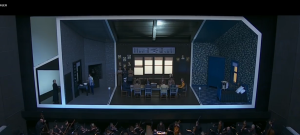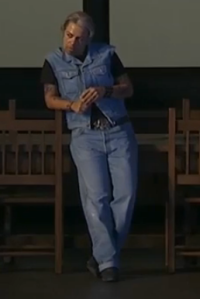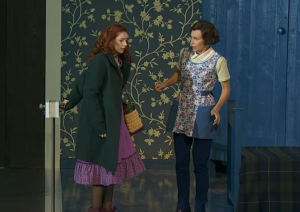 This production of Handel’s Ariodante has a little twist at the end that I rather liked – it was particularly effective in that the production itself on average does not scream “weird!” or “we’re going to mess with this opera!” It’s set in what looks like a farmhouse in Scotland in the 1940s. (Or, based on the amount of hair and mild griminess and puppets and lots of chunky sweaters, possibly in the vicinity of the Evergreen State College in the 1990s.) During the overture, we see a minister, who turns out to be Polinesso (Sonia Prina) leading a religious service around the table – Polinesso reminds everyone of the evil of women and so on and so forth.
This production of Handel’s Ariodante has a little twist at the end that I rather liked – it was particularly effective in that the production itself on average does not scream “weird!” or “we’re going to mess with this opera!” It’s set in what looks like a farmhouse in Scotland in the 1940s. (Or, based on the amount of hair and mild griminess and puppets and lots of chunky sweaters, possibly in the vicinity of the Evergreen State College in the 1990s.) During the overture, we see a minister, who turns out to be Polinesso (Sonia Prina) leading a religious service around the table – Polinesso reminds everyone of the evil of women and so on and so forth.
 But Polinesso is not what he seems. Under his clerical robe he sports a black t-shirt, denim vest, biker belt buckle and lots of tats (Prina struts this outfit with aplomb) and under his ministerial exterior he is of course a complete creep. He is assisted in his designs by Dalinda (Sandrine Piau) who in this instance is a weak person who appears to be distressed enough by her weakness to feel bad about helping Polinesso roofie Ginevra in Act II, but, you know, not distressed enough not to do it. This character is a tricky one, since she has to be both believably weak-willed and amenable to manipulation but with enough latent backbone to get to “neghittose, or voi che fate” in Act III. Dalinda doesn’t know what she’s about – she’s tearful about drugging Ginevra’s glass of water so that the trick can be played on Ariodante, in Act II; she gets smacked around by Polinesso, who appears to rape her – Dalinda is saying no as he grabs her, shaking her head and struggling, but it’s a sad, resigned struggle, as though she doesn’t think she deserves any better than this; at the end, after her worth as a human being has been validated by the fact that a dude – Lurcanio – still loves her, as he balls up Polinesso’s bloodstained denim vest and stuffs it into the stove, she looks as if she wants to hold him back, but she doesn’t. Sucks to be Dalinda. Doesn’t at all suck to listen to Sandrine Piau, though.
But Polinesso is not what he seems. Under his clerical robe he sports a black t-shirt, denim vest, biker belt buckle and lots of tats (Prina struts this outfit with aplomb) and under his ministerial exterior he is of course a complete creep. He is assisted in his designs by Dalinda (Sandrine Piau) who in this instance is a weak person who appears to be distressed enough by her weakness to feel bad about helping Polinesso roofie Ginevra in Act II, but, you know, not distressed enough not to do it. This character is a tricky one, since she has to be both believably weak-willed and amenable to manipulation but with enough latent backbone to get to “neghittose, or voi che fate” in Act III. Dalinda doesn’t know what she’s about – she’s tearful about drugging Ginevra’s glass of water so that the trick can be played on Ariodante, in Act II; she gets smacked around by Polinesso, who appears to rape her – Dalinda is saying no as he grabs her, shaking her head and struggling, but it’s a sad, resigned struggle, as though she doesn’t think she deserves any better than this; at the end, after her worth as a human being has been validated by the fact that a dude – Lurcanio – still loves her, as he balls up Polinesso’s bloodstained denim vest and stuffs it into the stove, she looks as if she wants to hold him back, but she doesn’t. Sucks to be Dalinda. Doesn’t at all suck to listen to Sandrine Piau, though.
 On the subject of the worth of human beings. This is where the twist at the end comes in. The opera begins with religious gas from Polinesso about how women are crap. And then soon after this comes one of the nastier aspects of this story – when the accusation of unchastity is made against Ginevra, everyone immediately believes it, including her father. There is no way for her to defend herself, so she goes a bit crazy. Patricia Petibon, by the way, is perfect for this role. I sometimes find her quirkiness annoying, but in this case, she’s not the slightest bit irritating. Ginevra is a little odd – she’s the sort of girl who twirls around on tabletops holding seashells, in a way that is second cousin to Manic Pixie Dream Soprano but it works. She sounds gorgeous, and Ginevra’s big moments, like her lament at the end of Act II, are bang on – some of the last repetitions of I think the line is something something di più, but I kept getting distracted by the French subtitles but anyway, the way she sings that is sort of heartbreaking.
On the subject of the worth of human beings. This is where the twist at the end comes in. The opera begins with religious gas from Polinesso about how women are crap. And then soon after this comes one of the nastier aspects of this story – when the accusation of unchastity is made against Ginevra, everyone immediately believes it, including her father. There is no way for her to defend herself, so she goes a bit crazy. Patricia Petibon, by the way, is perfect for this role. I sometimes find her quirkiness annoying, but in this case, she’s not the slightest bit irritating. Ginevra is a little odd – she’s the sort of girl who twirls around on tabletops holding seashells, in a way that is second cousin to Manic Pixie Dream Soprano but it works. She sounds gorgeous, and Ginevra’s big moments, like her lament at the end of Act II, are bang on – some of the last repetitions of I think the line is something something di più, but I kept getting distracted by the French subtitles but anyway, the way she sings that is sort of heartbreaking.
But anyway. Ginevra’s prospects are illustrated by a little puppet show at the end of each act. At the end of Act I Puppet Ginevra and Puppet Ariodante are married, and there are lot of really creepy little faceless crawling puppet babies. At the end of Act II, Puppet Ginevra is re-clad in a black dress made from a garbage bag and red stilettos, and is shown hitchhiking away and becoming a prostitute – all she is good for now, obviously. At the end of Act III, when all seems to be well again, Puppet Ginevra and Puppet Ariodante are back together. But during the celebrations, as we see yet another Bible quotation, this one about how men should not live alone and wives are great, Ginevra puts on her coat, picks up her suitcase and walks quietly out into the dark; the last thing we see is her holding out her thumb to hitchhike. This poor young woman has been through the wringer, after all – everyone loves her, until they think she’s not a virgin, and then everyone despises her, and then when it’s revealed she’s chaste after all, everyone loves her again. Love has some serious limits in this little world, and a person might be forgiven for feeling sad and hurt and deciding to get the hell out of there.
The effect of the ending is heightened by Ariodante (Sarah Connolly) and Ginevra’s last duet just before. It’s beautifully sung, and the feeling is of heartfelt, but not gushing happiness. Ginevra clearly loves Ariodante – but nevertheless it doesn’t feel like a complete volte-face when she leaves.
I have an audio recording of this performance, and I am very glad of it. Andrea Marcon’s orchestral direction didn’t make me leap out of my seat immediately, but there were a few touches during the overture that I liked, e.g. the tambourine. At several points I noticed some very pretty harpsichord playing (as well as the lute during the recitative before Ariodante’s “scherza infida”) and in general some moments where the orchestra sounded really enjoyably snappy, e.g. Lurcanio’s first aria in Act II and one of my favorites in this opera, Dalinda’s aria “Neghittosi or voi che fate” in Act III.
Sonia Prina sings as well as she swaggers (I really love Polinesso’s “evil” outfit – what is it about black t-shirts and tattoos? anyway) and she has numerous opportunities to do both, e.g. “spero per voi” in Act I, or “dover, giustizia” in Act III. I also enjoyed the moment when Polinesso first comes to annoy Ginevra – the note on the second syllable of the drawn-out “Ginevra….” is different from what I’m used to, a little creepier. I also found myself liking tenor David Portillo as Lurcanio – not just the sound and all that, but also the little twitchy thing he does here with one shoulder when the ornamentation gets gnarly. The main draw for me here, though was Sarah Connolly, who did not disappoint. One of the things I like about her singing is how she can summon such depth and emotional force without the slightest hint of histrionics or hand-waving – it’s just there. It is possible to listen to her sing “scherza infida” (why does autocorrect always want it to be “scherzo, infida”? that is a very different meaning, after all) or “cieca notte, infini sguardi” several times in a row without getting the slightest bit tired of hearing it.
Whow! This sounds great! Is this on line somewhere?
LikeLike
It’s here:
http://culturebox.francetvinfo.fr/live/musique/opera/ariodante-de-georg-friedrich-haendel-au-festival-daix-2014-158995
LikeLike
I would just like to say that I am wearing a black t-shirt and have a tattoo. I think maybe I shall wear a black t shirt when this comes to the COC.
LikeLike
But do you have a death’s head belt buckle? It really makes the outfit.
LikeLike
Not yet!
LikeLike
I feel that special mention must also be made about the knitwear worn by the chorus. All The Fair Isle.
LikeLike
Yes – so many sweaters! Kinda made me wish I could knit things other than single-color squares and oblongs.
LikeLike
http://www.theartsdesk.com/opera/nightmare-aix-sarah-connolly-shocking-first-night <= did you read this? I just came across it and I might be behind the times… in which case, sorry, carry on. I've yet to watch the production but it's a dream cast for me.
LikeLike
I did – not sure what I think. I don’t think the protesters’ concerns are nuts (though as someone who lives in the US, the idea of such generous unemployment benefits for arts workers seems like a fairy tale dream to me) but it sounds like the system is far from perfect; and besides, there are ways of making their grievances known that might get them a little bit more sympathy.
LikeLike
France is far ahead in that aspect. I do agree with strikes/protests on principle, society is pretty shitty these days. Still, the audience and the musicians have nothing to do with it. I know I would have been annoyed had I been there.
LikeLike
Thanks for the review, I saw it too and I agree with most of what you say. It’s interesting to see a picture of the stage from afar, looking just like a dollhouse. I was close to the stage and out on the side, so I didn’t get that impression of separate rooms, I just saw them opening and closing the fake “doors” all the time but didn’t see the lines on the floor. I’ll definitely watch it online and compare notes with what I saw. I’m linking to my impressions from the first night (both of the disturbances caused by the protesters and the actual performance).
LikeLike
Just read & enjoyed your review – thank you for linking to it (and high five on your blog title and Captain Janeway picture! oddly enough, I just started re-watching Voyager).
LikeLike
ok, I’ve seen the first 30min and it’s already my favourite Ariodante! Praise the Lord, I was despairing.
LikeLike
Have you seen that ENO one from the late 90’s? It’s not my favorite either musically or conceptually but it’s sort of weird/interesting to hear it in English.
LikeLike
no, I read about it in your blog though. It was a hoot. I’m going to see Serse in English.
LikeLike